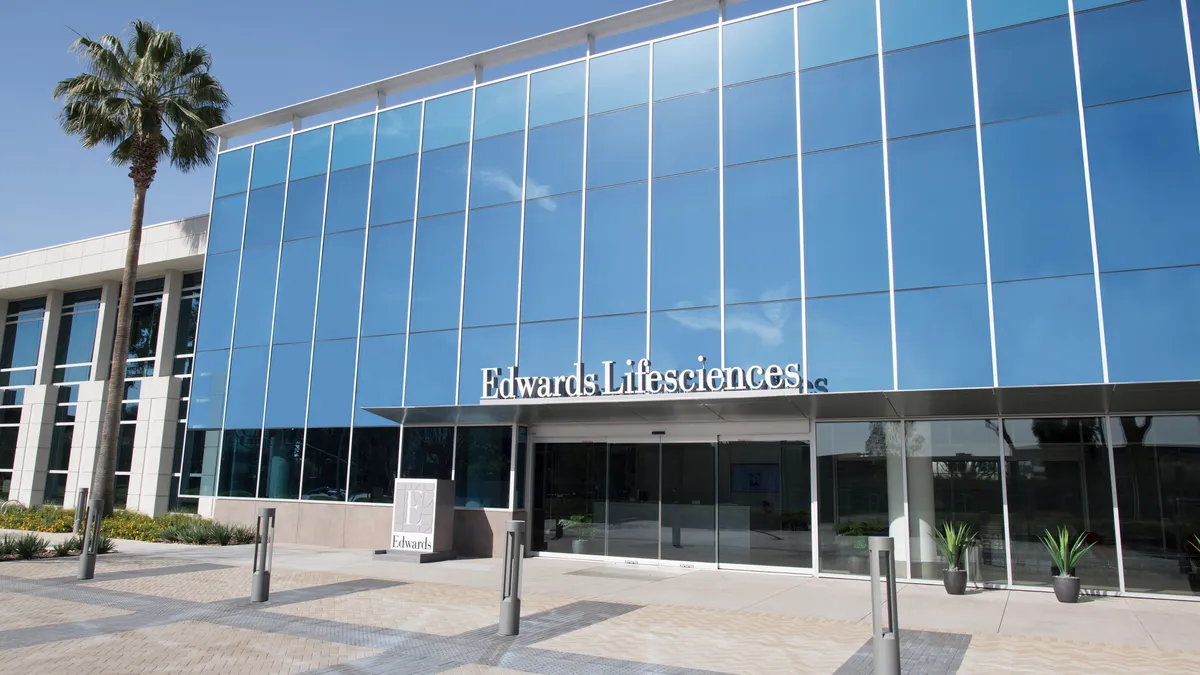Dive Brief:
- Edwards Lifesciences' Evoque transcatheter tircuspid valve replacement system reduced tricuspid heart valve leakage to non-traceable or mild leakage in 98% of participants in a single-arms study. The trial was sponsored by Edwards, according to clinicaltrials.gov.
- The Triscend study also showed that devices were successfully placed in 98% of participants and the overall procedure was determined a success for 94% of participants, according to results presented during the American College of Cardiology's 2021 annual meeting. A total of 56 patients were examined 30 days after a transcatheter tricuspid valve replacement procedure. Two participants died during the trial, one due to cardiac-related issues and one to non-cardiac-related issues.
- The results come as the tricuspid market is gaining momentum, with Abbott Laboratories currently competing alongside Edwards. Wall Street and industry contend the transcatheter tricuspid valve replacement market, combined with the mitral valve, can rival the growing transcatheter aortic valve replacement space.
Dive Insight:
As the TAVR market grows and matures, companies are turning to the mitral and tricuspid valves. While the transcatheter mitral valve market is currently more developed, the tricuspid space is gaining momentum as Edwards and Abbott are offering and further developing a tricuspid valve and a transcatheter delivery method.
Edwards has projected the mitral and tricuspid market to total $3 billion by 2025. However, the company's transcatheter mitral and tricuspid business is still in its infancy compared to TAVR. For example, Edwards projects the segment to double to about $80 million in sales in 2021, while TAVR is projected to bring in over $3 billion.
Meanwhile, Abbott first received a CE mark for a tricuspid valve in April 2020 and approval for the next generation of the device last month. The TriClip and transcatheter system, however, is only approved for investigational use in the U.S.
Still, Wall Street and industry predict the transcatheter mitral and tricuspid markets to grow into a combined multi-billion market annually and rival, if not grow past, the TAVR market, which Jefferies projected to grow to about $10 billion by 2025.
Tricuspid replacement procedures are used to treat patients whose tricuspid heart valve does not fully close and leaks blood back into the heart, called tricuspid regurgitation. Edwards' Evoque valve is used to replace a patient's tricuspid valve and is administered through a transcatheter procedure by going through the femoral artery in a patient's thigh.
While the procedure is minimally invasive, there are still challenges reaching the valve and then placing a device.
Susheel Kodali, director of the Structural Heart & Valve Center at NewYork-Presbyterian/Columbia University Medical Center and an investigator on the study, said during the ACC presentation that the Triscend trial and others looking at tricuspid procedures are helping illuminate which patients can be treated with the transcatheter replacement method. Patients requiring the tricuspid valve replacement often have severe comorbidities and anatomical variation can also make identifying patients challenging, according to Kodali.
"What percentage of the population will be anatomically excluded, clinically excluded are things that we've learned a lot ... But we need to continue to learn more," Kodali said.
After participants received the procedure, 77.4% showed no major adverse events after 30 days, according to the trial results. Twelve patients, about 23% of participants, experienced severe bleeding events, none of the events were life-threatening or fatal.
Because of procedure challenges, along with others like patients who have already had heart surgery or have pacemakers implanted, Kodali added that medical imaging is essential to conducting the procedures.
Participants of the study will be followed up again at six months, one year and annually for five years.
J.P. Morgan analysts called the results encouraging for the procedure and overall space as data for tricuspid replacement was previously limited. The analysts wrote the trial results are "a great step in the right direction, especially for the tricuspid valve, which has poor surgical outcomes, and view this as a relatively overlooked long-term value driver."
Evercore ISI analysts were similarly positive regarding the results, particularly highlighting that the study was not hindered by the challenge of navigating around implanted pacemakers.
"The fact that 98% of implants were successful is a big deal in our mind given the questions around pacemaker leads hindering deployment," the analysts wrote.
About one-third of the 56 patients studied had a pacemaker or implantable cardioverter defibrillator.
The results of the Triscend study have led Edwards to launch a pivotal trial, called Triscend II, with plans to enroll 775 participants and a primary completion date of June 2024.











